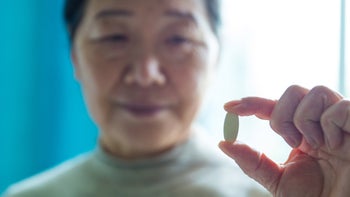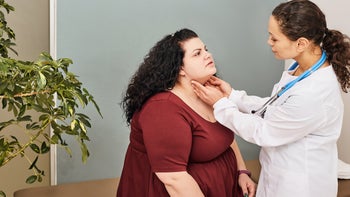levothyroxine
Levothyroxine is a thyroid hormone used to treat low thyroid hormone levels (hypothyroidism) in people of all ages. It's also approved to help treat thyroid cancer along with radioactive iodine and surgery. The medication is available in tablet and liquid forms and is taken once daily, usually on an empty stomach in the morning. Regular blood tests are needed to keep your dose in the right range. Common side effects happen when the dose is too high and can include fast heartbeat, anxiety, and weight loss.

What is Levothyroxine?
What is Levothyroxine used for?
Hypothyroidism (low thyroid hormone levels)
Thyroid cancer, together with radioactive iodine and surgery
How Levothyroxine works
Levothyroxine is a lab-made version of thyroxine (T4), a natural hormone made by your thyroid. It works by replacing or adding to the T4 your body isn’t making. This helps keep your metabolism, energy, heart rate, and body temperature working properly.
In people with thyroid cancer, levothyroxine is used to keep thyroid-stimulating hormone (TSH) levels low. Lowering TSH might help prevent cancer from coming back after treatment.
Drug Facts
More on Levothyroxine essentials

Get your GoodRx coupon

What are the side effects of Levothyroxine?
Common Side Effects
- Irregular heartbeat
- Chest pain
- Shortness of breath
- Leg cramps
- Headache
- Nervousness
- Hives or skin rash
- Irritability
- Trouble sleeping
- Tremors
- Muscle weakness
- Change in appetite
- Weight loss
- Vomiting
- Diarrhea
- Sweating a lot
- Sensitivity to heat
- Fever
- Changes in menstrual period
Other Side Effects
- Tiredness
- Anxiety
- Muscle spasm
- Fast heart rate
- Stomach cramps
- Hair loss
- Flushing
- Rash
Serious Side Effects
- Heart problems: chest pain, shortness of breath, fast or pounding heartbeat
Source: DailyMed
More on Levothyroxine side effects
The following side effects have also been reported
Along with its needed effects, a medicine may cause some unwanted effects. Although not all of these side effects may occur, if they do occur they may need medical attention.
Check with your doctor immediately if any of the following side effects occur:
Less common
Chest pain or discomfort
decreased urine output
difficult or labored breathing
difficulty with swallowing
dilated neck veins
extreme fatigue
fainting
fast, slow, irregular, pounding, or racing heartbeat or pulse
heat intolerance
hives or welts, skin itching, rash, or redness
irregular breathing
irritability
menstrual changes
pain or discomfort in the arms, jaw, back, or neck
sweating
swelling of the eyes, face, lips, throat, or tongue
tightness in the chest
Get emergency help immediately if any of the following symptoms of overdose occur:
Symptoms of overdose
Change in consciousness
cold, clammy skin
confusion
disorientation
fast or weak pulse
lightheadedness
loss of consciousness
sudden headache
sudden loss of coordination
sudden slurring of speech
Some side effects may occur that usually do not need medical attention. These side effects may go away during treatment as your body adjusts to the medicine. Also, your health care professional may be able to tell you about ways to prevent or reduce some of these side effects. Check with your health care professional if any of the following side effects continue or are bothersome or if you have any questions about them:
Less common
Abdominal or stomach cramps
change in appetite
crying
false or unusual sense of well-being
fear or nervousness
feeling not well or unhappy
feeling of discomfort
feeling of warmth
feeling things are not real
feelings of suspicion and distrust
headache
increased appetite
mental depression
muscle weakness
quick to react or overreact emotionally
rapidly changing moods
redness of the face, neck, arms, and occasionally, upper chest
restlessness
trouble getting pregnant
trouble sitting still
unusual tiredness or weakness
vomiting
weight gain or loss
Other side effects not listed may also occur in some patients. If you notice any other effects, check with your healthcare professional.
Call your doctor for medical advice about side effects. You may report side effects to the FDA at 1-800-FDA-1088.

Pros and cons of Levothyroxine

Pros
First-choice medication for treating low thyroid hormone levels
Safe to use during pregnancy
Only needs to be taken once a day
Available as a liquid solution (Tirosint Sol, Thyquidity, and Ermeza)

Cons
Must be taken on an empty stomach
Might take several weeks to find the right dose
Requires regular blood tests
Interacts with many foods, medications, and supplements

Pharmacist tips for Levothyroxine

Take levothyroxine 30 minutes to 1 hour before breakfast on an empty stomach. This helps your body absorb the full amount of the medication.
It's important to keep all of your follow-up lab appointments while taking levothyroxine. Your prescriber will use thyroid blood tests to check your hormone levels and adjust your dose if needed.
It can take several weeks to find the right dose of levothyroxine that works best for you.
Share a list of your medications with your prescriber before starting levothyroxine. This helps them check for interactions and guide you on when to take your other medications.
Soybean flour, walnuts, cottonseed meal, high-fiber foods, and grapefruit juice might reduce how much levothyroxine your body absorbs. Let your prescriber know if you eat these foods often so they can help you adjust your diet if needed.
Most side effects of levothyroxine happen when your dose is too high. If you feel anxious, have a fast heart rate, have trouble sleeping, or have other signs of too much thyroid hormone, let your prescriber know.
Some people may have temporary hair loss during the first few months of levothyroxine treatment. This side effect is usually mild and goes away over time.
Tell your prescriber if you're pregnant, breastfeeding, or planning to become pregnant while taking levothyroxine. Your dose might need to be adjusted to keep you and your baby healthy.
Tips for the liquid solutions:
Tirosint Sol: You can squeeze the solution directly into your mouth or onto a spoon and drink it immediately. You can also mix it in a small cup of water, drink it right away, then rinse the cup with more water and drink that too. Don't mix it with any other liquid besides water.
Thyquidity or Ermeza liquid solution: Measure your doses with the syringe provided by the pharmacy. Don't use household or kitchen measuring spoons since they might give you the wrong dose.
Store the medication at room temperature, away from heat and light. Ermeza and Tirosint Sol should be thrown away 3 months after opening, while Thyquidity should be thrown away 2 months after opening.
More on Levothyroxine tips

Frequently asked questions about Levothyroxine

How to save using GoodRx




What are the risks and warnings for Levothyroxine?
Levothyroxine can cause some serious health issues. This risk may be even higher for certain groups. If this worries you, talk to your doctor or pharmacist about other options.

Not for weight loss
Risk factors: Taking other medications for weight loss
Levothyroxine shouldn't be used for weight loss. It’s not recommended, safe, or effective for that purpose. Taking high doses of levothyroxine can cause serious or even life-threatening effects, especially if taken with other medications for weight loss.

Heart problems
Risk factors: Heart disease | Older adults
Taking too much levothyroxine can cause heart problems, especially if you have heart disease or are an older adult. If you develop new heart symptoms or your current ones get worse, your prescriber might lower your dose or pause treatment for a week before restarting it at a lower dose. Always tell your prescriber if you feel chest pain, a racing heartbeat, or other heart-related symptoms.

Adrenal crisis in people with adrenal insufficiency
Risk factors: Adrenal insufficiency
If you have adrenal insufficiency (a condition where your adrenal glands don’t make enough hormones), starting levothyroxine too soon can lead to a serious condition called adrenal crisis. This can happen because thyroid hormone speeds up how your body breaks down steroid hormones, which help you manage stress. To help prevent this, your prescriber will likely treat you with replacement steroids before beginning levothyroxine. If you feel very tired, have stomach pain, feel dizzy or weak, or start vomiting while taking this medication, get medical help right away.

Worsening diabetes
If you have diabetes, starting levothyroxine can make it harder to keep your blood sugar levels under control. You might need to adjust your diabetes medications or insulin after starting, stopping, or changing your dose of levothyroxine. Your prescriber will likely monitor your blood sugar more closely during this time to keep you safe and avoid complications. Let them know if you notice changes in your blood sugar readings or symptoms like increased thirst, frequent urination, or tiredness.

Bone loss
Risk factors: Postmenopausal women | Higher doses
Taking levothyroxine can weaken your bones over time, especially if your dose is too high. The risk is greater for women after menopause. This happens because high thyroid hormone levels can make your body break down bone faster than it can rebuild it.
To lower this risk, your prescriber will give you the lowest dose possible that still keeps your thyroid levels in a healthy range. Be sure to attend all follow-up appointments and get regular lab tests to check your hormone levels and bone health.

Levothyroxine dosage forms

| Dosage | Quantity | Price as low as | Price per unit |
|---|---|---|---|
| 30 tablets of 25mcg | 3 packages | $15.57 | $5.19 |
| 90 tablets of 25mcg | 1 package | $15.23 | $15.23 |
| 30 tablets of 50mcg | 1 package | $7.19 | $7.19 |
| 90 tablets of 50mcg | 1 package | $16.23 | $16.23 |
| 30 tablets of 75mcg | 3 packages | $16.15 | $5.38 |
| 90 tablets of 75mcg | 1 package | $16.41 | $16.41 |
| 30 tablets of 88mcg | 1 package | $7.44 | $7.44 |
| 90 tablets of 88mcg | 1 package | $16.47 | $16.47 |
| 30 tablets of 100mcg | 3 packages | $16.25 | $5.42 |
| 90 tablets of 100mcg | 1 package | $14.38 | $14.38 |
| 30 tablets of 112mcg | 3 packages | $16.76 | $5.59 |
| 90 tablets of 112mcg | 1 package | $16.99 | $16.99 |
| 30 tablets of 125mcg | 3 packages | $16.93 | $5.64 |
| 90 tablets of 125mcg | 1 package | $14.99 | $14.99 |
| 30 tablets of 137mcg | 1 package | $7.71 | $7.71 |
| 90 tablets of 137mcg | 1 package | $16.63 | $16.63 |
| 30 tablets of 150mcg | 1 package | $8.39 | $8.39 |
| 90 tablets of 150mcg | 1 package | $14.68 | $14.68 |
| 30 tablets of 175mcg | 1 package | $4.01 | $4.01 |
| 90 tablets of 175mcg | 1 package | $18.66 | $18.66 |
| 30 tablets of 200mcg | 3 packages | $16.11 | $5.37 |
| 90 tablets of 200mcg | 1 package | $15.89 | $15.89 |
Typical dosing for Levothyroxine
Hypothyroidism:
Adults: The typical starting dose is 1.6 mcg/kg of body weight, taken by mouth once a day. After 4 to 6 weeks, your dose might be adjusted based on your thyroid hormone levels.
Your dose might be lower if you have heart problems or are an older adult.
Children: The typical starting dose ranges from 1.6 mcg/kg to 10-15 mcg/kg per day, based on your child's age and body weight. After 2 weeks, the dose might be adjusted based on their thyroid hormone levels.
Your child's dose might be lower if they have heart problems.
Thyroid cancer:
Your dose will depend on your thyroid hormone levels and the stage of cancer.
More on Levothyroxine dosage forms

Interactions between Levothyroxine and other drugs
More on Levothyroxine interactions
Using this medicine with any of the following medicines is usually not recommended, but may be required in some cases. If both medicines are prescribed together, your doctor may change the dose or how often you use one or both of the medicines.
Using this medicine with any of the following medicines may cause an increased risk of certain side effects, but using both drugs may be the best treatment for you. If both medicines are prescribed together, your doctor may change the dose or how often you use one or both of the medicines.
- Aluminum Carbonate, Basic
- Aluminum Hydroxide
- Aluminum Phosphate
- Calcium Acetate
- Calcium Carbonate
- Calcium Citrate
- Chlorotrianisene
- Cholestyramine
- Chromium
- Ciprofloxacin
- Colesevelam
- Conjugated Estrogens
- Conjugated Estrogens Synthetic A
- Conjugated Estrogens Synthetic B
- Dexlansoprazole
- Dienestrol
- Diethylstilbestrol
- Dihydroxyaluminum Aminoacetate
- Dihydroxyaluminum Sodium Carbonate
- Esomeprazole
- Esterified Estrogens
- Estradiol
- Estramustine
- Estriol
- Estropipate
- Ethinyl Estradiol
- Fosphenytoin
- Imatinib
- Iron
- Kelp
- Lansoprazole
- Lanthanum Carbonate
- Lopinavir
- Magaldrate
- Magnesium Carbonate
- Magnesium Hydroxide
- Magnesium Oxide
- Magnesium Trisilicate
- Mestranol
- Omeprazole
- Pantoprazole
- Patiromer
- Phenytoin
- Polyestradiol Phosphate
- Promestriene
- Quinestrol
- Rabeprazole
- Rifampin
- Ritonavir
- Semaglutide
- Sevelamer
- Simvastatin
- Tibolone

How much does Levothyroxine cost?

Levothyroxine contraindications
Untreated adrenal gland problems

What are alternatives to Levothyroxine?
Hypothyroidism (low thyroid hormone levels)
Thyroid cancer, together with radioactive iodine and surgery
Hypothyroidism (low thyroid hormone levels)
Thyroid cancer, together with radioactive iodine and surgery
Hypothyroidism (low thyroid hormone)
Lowering thyroid-stimulating hormone (TSH) levels in people with other thyroid problems like goiters or thyroid cancer

What is the latest news about Levothyroxine?

Levothyroxine images
Get savings updates for Levothyroxine
Receive price alerts, news, and other messages from GoodRx about Levothyroxine and other healthcare topics and relevant savings offers.By providing your email, you consent to receive marketing communications from GoodRx, which may include content and/or data related to men’s health, women's health, reproductive care, or sexual health. You agree to the GoodRx Terms of Use and acknowledge the Privacy Policy. You can unsubscribe at any time.
References
Best studies we foundAmerican Cancer Society. (2024). Radioactive Iodine (Radioiodine) Therapy for Thyroid Cancer.
American Cancer Society. (2024). Thyroid Hormone Therapy.
Azurity Pharmaceuticals, Inc. (2025). THYQUIDITY- levothyroxine sodium solution [package insert]. DailyMed.
Dhaliwal, S. K. (2023). Acute adrenal crisis. MedlinePlus
IBSA Pharma Inc. (2025). TIROSINT SOL- levothyroxine sodium solution TIROSINT SOL- levothyroxine sodium solution [package insert]. DailyMed.
Jonklaas, J., et al. (2014). Guidelines for the treatment of hypothyroidism: Prepared by the American Thyroid Association task force on thyroid hormone replacement. Thyroid.
NorthStar RxLLC. (2025). LEVOTHYROXINE SODIUM tablet [package insert]. DailyMed.
Viatris Specialty LLC. (2022). ERMEZA- levothyroxine sodium solution [package insert]. DailyMed.
Compare other Thyroid Cancer, Hypothyroidism drugs
Browse medications
View AllResearch prescriptions and over-the-counter medications from A to Z, compare drug prices, and start saving.


















